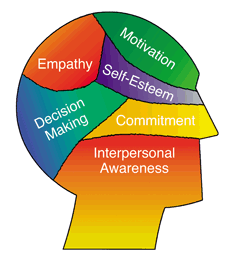Some weeks ago I was checking out the SEI collaboration portal and a link to an article about ‘Emotional Intelligence’ caught my eye. This term struck me as somewhat of an oxymoron because when I think of intelligence, I think IQ. As a person who is naturally curious about other people and what makes them tick, I was eager to read more.
I found that Emotional Intelligence, measured by a person’s emotional quotient (EQ), is indeed a term recognized by the professional community. EQ is that “special something” in each of us that is a bit intangible. It affects how we manage behavior, navigate social complexities, and make personal decisions to achieve positive results. It has two major components, personal and social awareness.
- Personal competence comprises your self-awareness and self-management skills.
- Social competence is made up of your social awareness and relationship management skills.
The article outlines many qualities possessed by people with high EQs. As I read, I realized that many of these same EQ traits are the hallmarks of good project leaders. If you get more in tune with your EQ and that of your team members, it can have an incredibly positive impact on your management style and project delivery. I started thinking of all the projects I’ve been involved with or have heard my colleagues describe and thought of qualities that seemed to exemplify high EQ.
Emotional Vocabulary
People with high EQs master their emotions because they understand them. Label your emotions, give them a name. Instead of just using upset, try something more descriptive like downtrodden, frustrated, or anxious. The more specific the word, the better the insight into what went wrong and how you can solve it. As you master your own emotional vocabulary, also seek to find out how your team members are ‘feeling’. You can then gain insight from their perspective and help them move toward a common solution.

A few years ago, mid-way through a project I was running, we uncovered additional
needed work. One of my rock star team members was not allowing other competent team members to assist her with completing the additional tasks. In a one-on-one, she confided in me how she felt incompetent because she couldn’t meet her deadline. I reminded her that the additional work was not factored into the initial estimate and it was not a reflection on her competency, she simply needed additional help. After we jointly crunched the numbers to estimate the additional time required, it was obvious she couldn’t possibly finish them herself within the deadline and was then willing to let her team mates help.
Embrace Change
Emotionally intelligent people are flexible and constantly adapt to change. As project managers, our job requires that we actually PLAN for change; but, change and surprises can rattle even the best PM. We commonly discuss the risk of getting hit by the “proverbial” truck. For one of my projects, it became a reality! My lead developer on the project was hit by a truck one month before go-live and thankfully he survived and is thriving! In the immediate aftermath, we rallied behind him and his family. Once we sorted through the emotions of such a devastating event, we sat down and identified work that we could delay until after the production release while our team mate recovered.
Don’t let your team get stuck in the moment. Whether the change is big or small, constantly be on the lookout and determine how you will adapt. Engage your team and quickly identify ways to recover.
Let Go of Mistakes
Another hallmark of emotional intelligence is letting go of mistakes. People with high EQs actually transform failures into improvements. In project management, we call these ‘Lessons Learned’. A good project team, egos aside, will conduct a careful evaluation of where they went wrong to identify how they can improve on future projects.
Difficult to Offend
Emotionally intelligent people are difficult to offend. They poke fun at themselves and even laugh at their own mistakes. Being self-confident and open minded creates thick skin. As a PM, admit your mistakes up front, don’t try to hide them and encourage your team to do the same. Recently I requested a large amount of data that was necessary for a conversion we were doing. I missed a critical piece of data needed for our team to start their planning work as scheduled and because of my mistake our planning started a week late. I called the impacted team members and the people providing the data, apologized for the mistake and how it set us back, and then together we set a new date.
Say NO
If you are emotionally gifted, you are not afraid to say, “No.” The words, “I think I can,” or, “I’m not certain,” are not in your vocabulary. Exercising these words helps you honor your current commitments and gives you the opportunity to successfully fulfill them. Next time a colleague asks you something that you KNOW your team cannot accommodate tell them, “No.” You could say something like, “No, we can’t finish that by 5:00 pm today due to other commitments, but we can get it to you by Friday at 3:00 pm.” Your team will thank you.
Give and Expect Nothing in Return
Strong relationships are built when you are thinking of and serving others. At SEI we call this ‘servant leadership’. You are not in the game for your own glory or accolades. You are constantly striving for the success of your client and the common good of your project team. As you lead your project, constantly assess and ask yourself, “Am I taking this action for personal motives or is what I am doing advancing the goals of the team, meeting the business need, or helping my boss increase her credibility among her peers?”
Don’t Seek Perfection
If you expect perfection you will have a sense of failure most of the time. People with high EQ get excited about what they have achieved and will accomplish in the future. We can liken this to a practice like ‘defect management’ in our project world. Many projects don’t have to roll to production with 100% of the defects solved. Instead, you give Critical, High, Medium, and Low defects a definition and assign acceptable resolution percentages for each. Define what success is for your project and don’t overshoot it.
Know Your Strengths and Weaknesses
What are you good at and where are you simply average? Who or what really pushes your buttons? Work to your strengths; keep weaknesses from holding you back. Know your own strengths and weaknesses and, just as important, your team’s as well. That person on your team who excels technically but is not the best people person, don’t force them into a team lead position. Put them in an analyst role and if they are really interested in leading people, give them opportunities to hone their people and leadership skills.
These are just some of the qualities of ‘emotionally intelligent’ people. Take a look at more traits in Travis Bradberry’s Why You Need Emotional Intelligence to Succeed article and consider how you can apply them in the day-to-day management of your projects. For one final but important note – although you’re IQ (ability to learn) at age 15 is the same as it is at age 50, emotional intelligence is a flexible set of skills you can acquire and build with practice. Challenge yourself to hone these skills and educate your teammates about EQ.
In loving memory of my daughter, Katie Stewart, the woman with the highest EQ I know.



